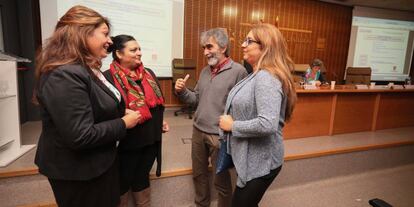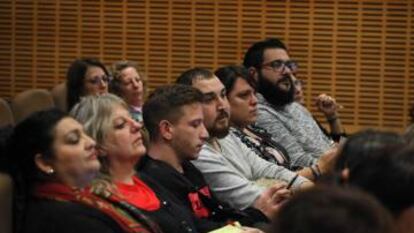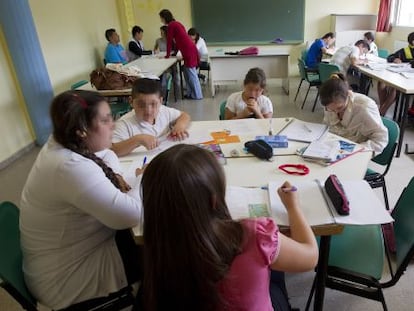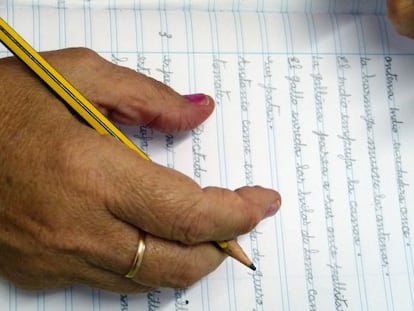Gypsy women in Spain poised to start a health revolution
Madrid region taking advantage of female clout in the 90,000-strong Roma community for a preventive healthcare pilot scheme

“We are embarking on a silent revolution,” says Ana Vázquez from the Alboreá Association of Roma Women during a workshop held in the Santa Cristina Hospital to explore the challenges of health in this marginalized community. “We are promoting development within the Gypsy community by empowering the women.”
Within the Gypsy community it is clearly the women who are the agents of change
Eduardo Conejo, Gypsy Secretariat Foundation
Vázquez goes on to outline the proposals that will help the almost 90,000 Roma in Madrid to feel more comfortable accessing the public health service.
Casting women from the community in the role of mediators is at the heart of the initiative. Five such go-betweens – the maximum number allowed by the scheme for 2019 – will be used to smooth out cultural issues and to promote the basics of preventive medicine; tackling diet, tobacco and the refusal to accept medical treatment, all of which reduce life expectancy in the community by up to 15 years.
A healthy connection
“We believe there is a lack of connection between the health system and the Roma community,” says Juan Martínez Hernández, director general of the public health service in the Madrid region. “There can be problems with showing up and people who drop out of treatment; with preventive measures such as mammograms, vaccinations and screen testing. We need someone who can motivate them, who can accompany them and who will intervene when there are cultural problems, which can at times lead to conflict, even if that’s not the norm. It’s important to intervene now,” he adds. “And it’s the women who are changing things for the Gypsy community.”
Vázquez agrees. “Women have always had a very special role in Roma culture,” she says. “It is the women who hand down our culture and our values to the next generation. And this role is now being used to drive change.”
The five mediators will be working predominantly out of health centers in the districts of Vallecas and Villaverde where most of the region’s gypsies live. But they will also go out into the community itself.
From an educational perspective, they will inform families of their right to see a doctor and make clear the differences between medical and social services. They will also mediate situations of possible conflict where, for example, too many family members are gathered in limited access areas, as the regional government puts it. But first, the women need to gain the trust of the community.
A question of education
“We have been considering the possibility of using a mediator for some time, whether Gypsy or otherwise, to inform and help the patients understand their illness and how it can be treated,” says Eduardo Conejo, deputy regional director of the Gypsy Secretariat Foundation in Madrid. “The job of a mediator is one of understanding. The other is to accompany and educate – particularly the women – in the importance of taking control of the family’s health and diet, thereby empowering them. Within the Gypsy community it is clearly the women who are the agents of change.”
We believe there is a lack of connection between the health system and the Roma community
Juan Martínez Hernández, Madrid public health service
There will be up to €150,000 available for the scheme, according to the proposed 2019 budget. But whether the financing materializes or not depends entirely on the results of the regional elections in May. Meanwhile, the regional government approved the Social Inclusion Plan last year for the Roma community, providing €219 million for 59 strategic measures to be implemented between 2017 and 2021. The Gypsy Secretariat Foundation is demanding clarity with regard to the budget and insists that Roma society is complex and varied and warns of the pitfalls of generalizations and stereotyping.
“Mediation is fine but we believe in a more integral approach to development within the community,” says Conejo. “There are also problems with being integrated into the workforce, which means people never get out of the downward spiral that prevents them from taking care of themselves and their health. There are problems in the field of education – today’s children could be positive role models for the next generation and achieve a level similar to the rest of the population. And there are problems with housing. What this is really about is closing the gap that exists between the Gypsy community and the rest of the population.”
According to the last National Health Survey, Gypsies not only have a shorter life expectancy, they also have more than their fair share of illness, way above the national average. Men mainly suffer from arthritis, diabetes and depression. Women, meanwhile, are prone to high blood pressure, arthritis, asthma, diabetes, high cholesterol, depression, mental health issues, migraines and problems linked to the menopause.
While medical experts and mediators exchanged ideas at the workshop on making the health service more accessible to the community, one of the few male candidates for the post of mediator stressed the significant role the women play in improving the community’s access to public services in general. “Without them, we would not have not achieved anything,” he said. “They talk about patriarchy in our community but it’s the women who take the reins. I’ve seen it with my mother and now I see it in my wife.”
Teenage weddings

Adolescents who leave school before the age of 14 and marriages between teenagers are serious problems within the Gypsy community. Carla Santiago Camacho, president of the Artemisa Federation, believes it is necessary to change the education system if the school dropout rate is to be reduced; currently 300 children start primary school and only five graduate high school. "We can't go on being the illiterate community that is invisible in society," she says.
Is it a case of racism? “There is anti-Gypsy sentiment and that means that we have to keep our roots a secret when we are mixing in society if we want to avoid unpleasant faces and stares,” she says. “If we manage to stop the segregation of children in schools and reduce absenteeism, that will be a big step towards children finishing their studies and finding more professional jobs.”
English version by Heather Galloway.









































